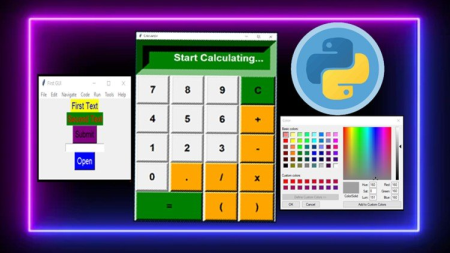Python GUI Programming With TKinter | Build 10 GUI Projects
- 18.03.2021
- 196

MP4 | Video: h264, 1280x720 | Audio: AAC, 44.1 KHz, 2 Ch
Genre: eLearning | Language: English + .srt | Duration: 47 lectures (5 hour, 34 mins) | Size: 2.19 GB
Tkinter is a Python binding to the Tk GUI toolkit.
What you'll learn
You will create an application to calculate Area of a Circle in Python GUI
You will create an application to calculate Area of a Triangle in Python GUI
You will create an application for currency converter software in this course
You will create an application for complete electronic calculator in this course
You will create an application for message box in this course
You will create an application for a digit counter in this course
You will create an application for color chooser in this course
You will create a file dialog application in this course
You will learn how to add buttons to your GUI application
You will learn how to add functionality to a button
You will learn how to create a text box
You will learn how to create multiple GUIs in one program
You will learn how to add Menu to window
You will learn how to add menu items to Menus
You will learn how to add functionality to menu item
You will learn how to read a file content in python GUI
You will learn about RadioButtons in GUI
You will learn how to add functionality to RadioButton
You will learn how to create RadioButtons using a list
You will learn how to add indicatoron to RadioButton
You will learn about Checkbox in Python GUI
You will learn how to get the values of Checkboxes
You will learn how to print out selected items from checkbox
You will learn how to add checkbox to menu item
You will learn how to add separator to menu bar
You will learn how to create data entry blocks
You will learn how to delete an entry in Data Entry block
You will learn how to create a ComboBox
You will learn how to Add functionality to ComboBox
You will create application to open image and draw graphic design in python GUI
Requirements
You are expected to learn the basics of Python programming before taking this course
Description
It is the standard Python interface to the Tk GUI toolkit, and is Python's de facto standard GUI. Tkinter is included with standard Linux, Microsoft Windows and Mac OS X installs of Python.
As with most other modern Tk bindings, Tkinter is implemented as a Python wrapper around a complete Tcl interpreter embedded in the Python interpreter. Tkinter calls are translated into Tcl commands, which are fed to this embedded interpreter, thus making it possible to mix Python and Tcl in a single application.
There are several popular GUI library alternatives available, such as wxPython, PyQt, PySide, Pygame, Pyglet, and PyGTK.
The generic term for any of the building blocks that make up an application in a graphical user interface.
Core widgets: The containers: frame, labelframe, toplevel, paned window. The buttons: button, radiobutton, checkbutton (checkbox), and menubutton. The text widgets: label, message, text. The entry widgets: scale, scrollbar, listbox, slider, spinbox, entry (singleline), optionmenu, text (multiline), and canvas (vector and pixel graphics).
Tkinter provides three modules that allow pop-up dialogs to be displayed: tk.messagebox (confirmation, information, warning and error dialogs), tk.filedialog (single file, multiple file and directory selection dialogs) and tk.colorchooser (colour picker).
Python 2.7 and Python 3.1 incorporate the "themed Tk" ("ttk") functionality of Tk 8.5. This allows Tk widgets to be easily themed to look like the native desktop environment in which the application is running, thereby addressing a long-standing criticism of Tk (and hence of Tkinter). Some widgets are exclusive to ttk, such as the combobox, progressbar and treeview widgets
The graphical user interface is a form of user interface that allows users to interact with electronic devices through graphical icons and audio indicator such as primary notation, instead of text-based user interfaces, typed command labels or text navigation. GUIs were introduced in reaction to the perceived steep learning curve of command-line interfaces (CLIs), which require commands to be typed on a computer keyboard.
The actions in a GUI are usually performed through direct manipulation of the graphical elements. Beyond computers, GUIs are used in many handheld mobile devices such as MP3 players, portable media players, gaming devices, smartphones and smaller household, office and industrial controls. Ref :
Who this course is for:
Anyone who wants to learn and start building Python Graphical User Interface applications today
DOWNLOAD
uploadgig
https://uploadgig.com/file/download/9f0334c4b2B79186/lxi3ybiN_.Python_GUI.part1.rar
https://uploadgig.com/file/download/d3F072d6E7e1d89A/lxi3ybiN_.Python_GUI.part2.rar
https://uploadgig.com/file/download/73661c5A54Fb7dcd/lxi3ybiN_.Python_GUI.part3.rar
rapidgator
https://rapidgator.net/file/18ddb2413eb6dc8af959e13440edcc79/lxi3ybiN_.Python_GUI.part1.rar.html
https://rapidgator.net/file/dea4383fcd51a2b002bdad9ec12ce5eb/lxi3ybiN_.Python_GUI.part2.rar.html
https://rapidgator.net/file/a2398ff9617375e21e4a5b57342fd57e/lxi3ybiN_.Python_GUI.part3.rar.html
nitroflare